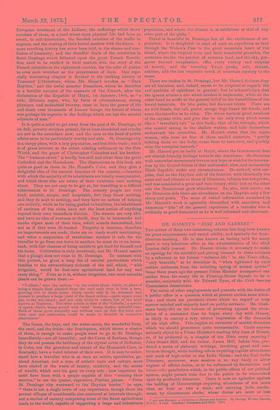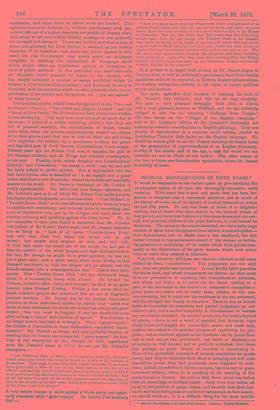DR. DASENT'S "JEST AND EARNEST."
THE author of these two interesting volumes has long been knowte for great acquirements and varied ability, and specially for Scan- dinavian learning. He is also known as having held for many, years a very laborious office in the administration of the chief London daily journal. Dr. Dasent thinks it necessary to make- an apology for the mirthful and jesting element in these volumes by a reference to his former "toilsome life" in the Times office, " only bearable," as he describes it, " when lightened by such sudden outbursts from the unfailing spring of animal spirits." Some three years ago the present Prime Minister transported our- author from his weary life in Printing-House Square to be a member, conjointly with Sir Edward Ryan, of the Civil Service Commission duumvirate.
The union of other employments and pursuits witb the duties of a public office is a question which at present excites some atten- tion ; and there are prevalent views which ws regard as very narrow-minded and unjustly hard on public servants. Mr. Glad- stone lately did us the honour of protesting against the circu- lation of a statement that he began every day with Homer, as likely to convey a very untrue impression of the demands of his high office. This implies an ostracism of mental diversion• which we should pronounce quite unreasonable. Could anyone seriously object to a Prime Minister's reading fifty lines of Homer, or, if he preferred it, a chapter of the Bible every morning ?• John Stuart Mill, and his father, James Mill, before him, pro- duced a series of elaborate writings, involving great and con- tinuous thought, while holding offices requiring regular attendance and work of high order in the India House ; and the East India Directors, moreover, were masters in no way likely to allow neglect of official duties, or to be influenced by favouritism and' laisser-aller proclivities which, in the public offices of our political system, might permit time due to the public to be encroached upon by profitable literature. There is now an agitation against the holding of Directorships requiring attendance of not more- than an hour or two a week, and carrying little emolu- ment, by Government clerks, whose duties are more or less
• Jut and Earnest: a Collection of Essays and Reeiries. By George Webbe Dasent, D.C.L. 2 yobs London: Chapman and Hall. 1873.
mechanical, and whose hours of official work are limited. This agitation cannot be deferred to, without interference with per- manent officials of a higher class who are prolific of literary work. And surely we are not to deny literary evenings to our generally not overpaid civil servants. There may be here and there a case of abuse, but generally the Civil Service is elevated by the literary character of its members ; and while the public pocket is duly cared for, the Government may surely count on deliberate sympathy in resisting the commercial or demagogic spirit which would allow no intellectual pursuit or recreation to salaried public servants. In this particular case, most assuredly no objection could possibly be taken to Dr. Dasent, who has simply collected a number of essays published before he became a Civil Service Commissioner ; and we should be sorry to have lost, with an exception which we shall presently state, the re- production of the playful and the serious, the " jest and earnest " of these volumes.
Two political squibs, which formerly appeared in the Times and in Fraser's Magazine, "The Greek and English Quarrel " and the " Story of Free Trade," Dr. Dasent would have shown true wisdom in not unburying. They may have been enjoyed as good fun at the time; it is fun of a rather rollicking quality ; but they are full of personal acerbity, the republication of which, twenty years after, when the persons contumeliously treated are almost all in their graves (and that one or two of them are still living little improves the matter), by a gentleman holding the grave and dignified post of Civil Service Commissioner, is not seemly. Twenty years ago Sir Robert Peel was, it appears, the god of Dr. Dasent's idolatry, and all Whigs and Liberals contemptible in his eyes. Finality Jack, whose dunghill was Constitutional Liberty," and Palmerston, "too heavy a swell," can be, and will be, fairly judged by public opinion. But a diplomatist like the late Lord Lyons, who is described as " a sea captain and a great talker and blurter-out of secrets," cannot be so fully and familiarly known to the world. Dr. Dasent's treatment of Mr. Cobden is really reprehensible. The Anti-Corn Law League agitation, and Mr. Cobden's part in it, of which Sir Robert Peel made a timely handsome acknowledgment, are thus described : " Poor Richard, or Tumble-Down Dick,' as he was afterwards called, when he began to meddle with everything, and to break down in everything, and a set of Manchester men, got up the League and went about the country lecturing and speaking against the Corn Laws." We do not remember to have ever heard a suspicion that Mr. Cobden was jealous of Sir Robert Peel's work, but Dr. Dasent describes him as being so. " Last of all came Tumble-Down Dick,' and said that Peel had taken the bread out of his mouth ; but people only laughed at that, and told him, if Peel had taken the bread out of his mouth, he had put it into the mouths of the whole people, and bade Richard stick to his last, for though he might be a great agitator, he was not yet a great man ; and a great many other home truths, so that Richard was forced to hold his tongue and go abroad, and his friends entered into a subscription for him." This is very inde- corous. This "Tumble-Down Dick " did not afterwards break down in a commercial treaty with France. He refused the Cabinet, lucrative office, titles, and honours ; he died, to his great 'honour, plain Richard Cobden. Within a few years after his death, common opinion has canonised him as one of England's greatest worthies. Dr. Dasent has in his preface deprecated criticism on these reproduced squibs, by saying that "mirth was
made of some statesmen for whom the writer has always felt great respect ; this, too, must be forgiven, if any one should feel hurt after so long a time at such freedom of speech." But -Cobden is no longer here to feel hurt or to forgive. What "great respect" for Cobden is discernible in these deliberately reproduced imper- tinences? Mr. Disraeli is living, and may probably forgive, on learning that Dr. Dasent has always felt "great respect" for him. This is the description of Mr. Disraeli in 1851, reproduced with Dr. Dasent's name in 1873 ; we are not Mr. Disraeli's champions :—
" One Stunning Ben, or Dizzy, so nicknamed from the dizziness which came over every one when he began to speak of his scheme of Protection. This man, it was said, Peel might have had if he would have given him a slice off one of the State loaves, or the tail of an 'official red-herring, but he would not have him at any price ; so Dizzy went and joined the landlords,thongh he was not a landlord born. And of all the men who now are he is the greatest master of clap-trap, so that in the mouths of all who came before him it seemed a trade, while in his it has risen to a science."
A very serious charge is made against a whole party, not appar- ently consistent with " great respect." Sir Robert Peel suddenly died:—
And you must know that the Whigs were either so frightened or so glad at Peel's death that they all ran out of town, and there was not one of them the next morning to say a good word for him in the House of Commons. But the day after that they came and did what they should have done the day before, and Finality Jack, in his languid way, spoke as kindly as he could of anyone, and many who had never a good word for Peel when he was alive, now could not find words to express the loss the country had met with, and so on, and so on. The old story over again—first stoning the prophets and then building their sepulchres. And after they had done praising Peel, the Whigs huddled up their traps, and shut up tho Commons' House, and ran off to make holiday in the country."
It is at least to be hoped that, so long as Dr. Dasent reigns in Cannon Row, it will be sufficiently proclaimed that Civil Service candidates will not be required, in Modern History examinations,
to conform themselves entirely to his views of recent political events and persons.
The more agreeable duty remains of praising the bulk of Dr. Dasent's two volumes ; and this we do very cordially. We pass a very pleasant fortnight with him in Faroe, and a very pleasant summer at Wildbad, and we are infinitely obliged to him for his amusing " Pickings from Poggio."
His two essays on the "Origin of the English Language " and on Dr. Latham's edition of Dr. Johnson's Dictionary are extremely valuable contributions to English philology. They are worthy of reproduction in a separate small volume, similar to Archbishop Trench's little books on the English language. We
should be indeed glad to see Dr. Dasent devoting his leisure hours to the preparation or superintendence of an English, dictionary,
worthy of the nation and of the age, a task for which we can conceive no one so fitted as our author. The other essays of the two volumes are Scandinavian specialities, where Dr. Daaent is entirely at home.



































 Previous page
Previous page